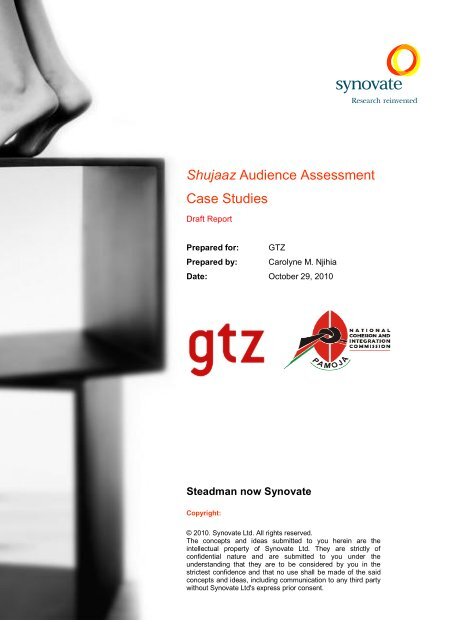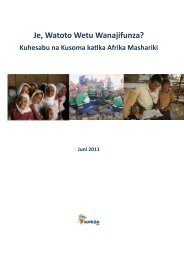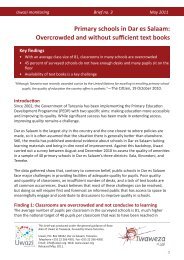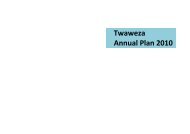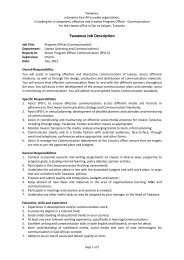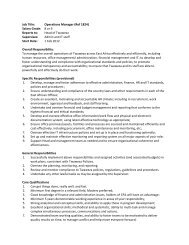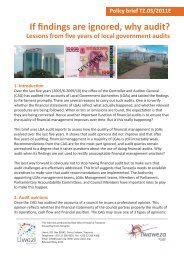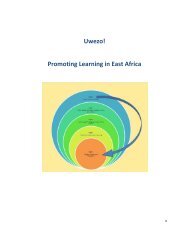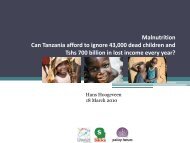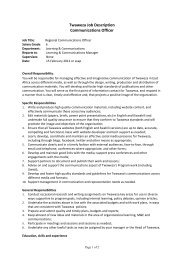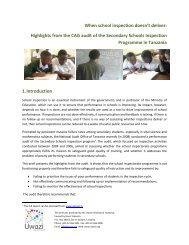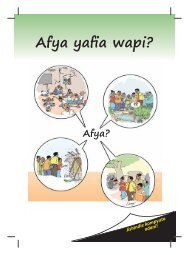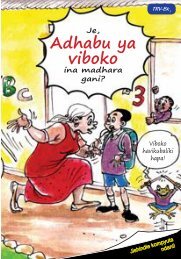Shujaaz Audience Assessment Case Studies
Case study report - Twaweza.org
Case study report - Twaweza.org
- No tags were found...
You also want an ePaper? Increase the reach of your titles
YUMPU automatically turns print PDFs into web optimized ePapers that Google loves.
<strong>Shujaaz</strong> <strong>Audience</strong> <strong>Assessment</strong><br />
<strong>Case</strong> <strong>Studies</strong><br />
Draft Report<br />
Prepared for: GTZ<br />
Prepared by: Carolyne M. Njihia<br />
Date: October 29, 2010<br />
Steadman now Synovate<br />
Copyright:<br />
© 2010. Synovate Ltd. All rights reserved.<br />
The concepts and ideas submitted to you herein are the<br />
intellectual property of Synovate Ltd. They are strictly of<br />
confidential nature and are submitted to you under the<br />
understanding that they are to be considered by you in the<br />
strictest confidence and that no use shall be made of the said<br />
concepts and ideas, including communication to any third party<br />
without Synovate Ltd's express prior consent.<br />
© Synovate 2010 (Steadman now Synovate)<br />
0
Content<br />
RESEARCH OVERVIEW 2<br />
ABRAHAM: BUSINESS PLAN/VEGETABLES 3<br />
CHRIS: MAKING PEACE 8<br />
PATRICIA: SOAKING SEEDS 13<br />
HELEN: KNOWING YOUR RIGHTS 18<br />
“DANEX”: RESOLVING CONFLICTS 21<br />
EUNICE: TEXTING FOR PEACE 26<br />
DUNCAN: SCHOOL COUNCIL 29<br />
DISCUSSION 34<br />
© Synovate 2010 (Steadman now Synovate)<br />
1
Research Overview<br />
The objective of the ethnographic case study was to understand the readers of the<br />
comic – in particular those on whom reading the comic has made an impact, including<br />
people who may have changed their minds and attitudes as a result, and people who<br />
tried out some of the ideas or techniques described in the comic.<br />
The case studies consisted of an immersion period whereby a researcher was required<br />
to spend two consecutive days together with the respondent in his /her environment.<br />
The research was based on participation, interaction and observation, as well as openended<br />
interviews with the respondent and short closed-ended questionnaires with<br />
other members of their social network, which will be used for a simple social network<br />
analysis. The main purpose of the immersion was to gather information on:<br />
The everyday life and day to day activities of the reader<br />
The social background and culture of the reader<br />
The social networks and relationships<br />
Their self-determination and leadership abilities<br />
Their views on topics around national cohesion, and how reading<br />
<strong>Shujaaz</strong> may have had an influence<br />
The technology they have adopted<br />
<strong>Case</strong> studies were conducted with 8 pre-selected readers of <strong>Shujaaz</strong> 1 between the<br />
ages of 13 and 35 years. Of these, 4 were male and 4 were female. The sample was<br />
split between four readers who had been influenced by national cohesion themes<br />
(peace building) and four who had tried out practical innovations (e.g. making a<br />
business plan or soaking seeds).<br />
During the immersion, six ways of collecting data were used:<br />
1. Observation<br />
2. Unstructured interviews<br />
3. Semi-structured scenarios and questions<br />
1 One of the eight readers (in Malindi), who had agreed to be portrayed, declined participation on the first<br />
day of the immersion, because of a death in the family. This person had to be replaced with another<br />
reader, and the remaining case study will be carried out on the weekend of October 30 st<br />
© Synovate 2010 (Steadman now Synovate)<br />
2
4. Structured interviews<br />
5. Listing of members of the social network their relationship<br />
6. Photographs<br />
Fieldwork for the seven completed case studies was conducted between 3 rd and 11 th<br />
October, 2010, with interviews administered in both Kiswahili and English.<br />
Abraham: Business Plan/Vegetables<br />
Abraham Juma is a 19 year old male living in Eldoret. He is from a very humble<br />
background, but thanks to <strong>Shujaaz</strong>, he has been able to draw up a business plan and<br />
sell vegetables from his small garden for profit. Abraham aspires to gradually expand<br />
his small farming business, save<br />
enough money to buy a big piece<br />
of land, acquire enough capital to<br />
enable him to venture into other<br />
types of profitable projects and to<br />
eventually become “a well known<br />
businessman all over Kenya and<br />
even abroad.” One of the people<br />
who he is most inspired by is Mike<br />
Sonko (the newly elected Member<br />
of Parliament for Makadara who is<br />
also among the youngest sitting MPs) because of his business acumen and success.<br />
Abraham believes that he himself can make it in life if Sonko is an example to go by.<br />
Abraham is confident that despite his humble beginnings, his future is bright. He adds,<br />
“I would love to be able to travel all over the country and also abroad. I would also like<br />
to be able to improve the lives of the people around me.”<br />
Abraham lives with his sister in a two-bedroom semi-permanent house; there are few<br />
permanent buildings in the surrounding area. The house and surrounding property<br />
© Synovate 2010 (Steadman now Synovate)<br />
3
elonged to Abraham‟s parents, but his father was retrenched from his place of work a<br />
few years ago, and now his parents live in their rural home in Bungoma. The small<br />
property which they left behind in Eldoret is now occupied by Abraham and his older<br />
sister. Abraham decided to till the small piece of land around the house and grow a few<br />
crops which he could sell. He currently grows maize, sukuma wiki, managu (a<br />
traditional vegetable), potatoes and tomatoes.<br />
Abraham‟s father regularly comes to Eldoret for medical treatment. He suffers from<br />
diabetes, and on this particular weekend, he is in town. Abraham spends most of his<br />
time at home taking care of his sick father since his mother is not around. The family<br />
shares the two chairs, single table and stool which are found in the house. Abraham‟s<br />
father owns one transistor radio which is operated by him primarily, and which<br />
Abraham listens to occasionally. When he does listen to the radio, he listens to Sayare<br />
FM. He has no access to television or internet at home, and neither do they have<br />
electricity. His family is withdrawn particularly from their neighbours, and they do not<br />
take much interest in Abraham‟s extracurricular activities. Abraham says that he<br />
prefers to spend time on his own so that he is not influenced by activities that do not<br />
benefit his life.<br />
On most days, Abraham likes to spend a considerable amount of time by himself. He<br />
usually takes a computer course in Eldoret town, but he is currently unable to afford the<br />
fees. Usually, his parents contribute to his school fees, while he uses his earnings from<br />
the garden to supplement the remaining balance. However, he makes occasional trips<br />
into town to visit his friends who are still in school. He also enjoys reading during his<br />
time alone, usually old newspapers that he gathers from his regular trips to Eldoret<br />
town. He spends most of the remaining time tending to his garden. Abraham gets most<br />
of his information from the radio and from his friends, including those he interacts with<br />
during church activities and programs. Once in a while, he enjoys watching football at<br />
his local shopping centre, although the opportunity only comes occasionally. A few of<br />
© Synovate 2010 (Steadman now Synovate)<br />
4
his friends have access to both television and newspapers so he sometimes accesses<br />
these media through his friends.<br />
In terms of discrimination, Abraham has experienced prejudice due to the fact that he<br />
comes from the Sabaot 2 community, a sub-tribe of the Kalenjin. When he was in high<br />
school, he and a few other friends were treated differently at sporting events because<br />
of the stereotype that all Sabaots were associated with Wycliffe Matakwei‟s brutal<br />
forces. He recalls another occasion when he experienced discrimination: “I used to [go<br />
to] school in Mount Elgon and there was a notorious rebel group that existed there<br />
called SDLF that used to kill people. During the post election violence, I went to a shop<br />
in Kakamega wearing my school uniform and the shop keeper refused to serve me<br />
because I was from Mount Elgon.” Abraham reacted calmly by leaving the store and<br />
going to another shop, but says “I felt very bad then because I was treated as if I was<br />
not a human being.” Although he shared the experience with some of his schoolmates,<br />
he never discussed the incident with his parents. He instead sought advice from a<br />
leader at church who advised him to ignore such acts and continue living peacefully.<br />
From his experiences, Abraham would “encourage people who are mistreated not to<br />
give up and tell those who mistreat others to stop.”<br />
Abraham believes that “the government should be advised to see all communities as<br />
equal and give them equal opportunities and equal distribution of resources.” He<br />
believes that government resources are not always distributed evenly, and people‟s<br />
needs are not met. He talks about the particular area in which he lives, saying: “there is<br />
no tarmac road within Mount Elgon district and [the government] should develop one.<br />
Schools are also not well developed and some students study under trees. Also<br />
markets are not well developed. We should have good governance and MPs should<br />
2 The Sabaot Land Defence Force (SLDF) is a guerrilla militia that has been operating in the Mount Elgon District of Rift<br />
Valley province since 2005. It has been accused of killing more than 600 people, and of committing a variety of<br />
atrocities including murder, torture, rape, and the theft and destruction of property. The group draws its members from<br />
the Sabaot people, who are a sub-tribe of the Kalenjin. They were led by Wycliffe Matakwei Kirui Komon, who has now<br />
been killed by security forces, who claimed to command 35,000 soldiers and scouts. (Source: Wikipedia)<br />
© Synovate 2010 (Steadman now Synovate)<br />
5
visit the constituencies and meet the people so that they can understand their needs.”<br />
He believes that Mount Elgon is home to people of different tribes including Kalenjin,<br />
Luo, Luhya, and Kikuyu, and their livelihoods should be supported. He also feels that<br />
the government can “advise people to read magazines like <strong>Shujaaz</strong> which will<br />
empower them and give them ideas.”<br />
When asked what he would think of a Mosque being constructed in the neighbourhood,<br />
he said: “I would not have a problem because they [Muslims] have freedom to worship<br />
and if there are Muslims around, they deserve to have a mosque.” He believes that<br />
people of other religious backgrounds “will not interfere with [his] faith” because<br />
regardless of their creed, they have a common belief in God. In an ideal country, he<br />
would like to have peace, freedom of expression and development.<br />
Even though Abraham says that <strong>Shujaaz</strong> has changed his life, he has not shared much<br />
of what he has learned from the comic with his sister. Abraham relies on well-wishers<br />
at the Mpesa agent to supply him a copy of the <strong>Shujaaz</strong> comic. He does not usually<br />
buy the newspaper and is not a regular user of M-pesa services; he usually collects old<br />
newspapers when he is in Eldoret town. For Abraham, the comic is not easily<br />
accessible, and he keeps his copies safely after reading them. Nevertheless, he feels<br />
that the makers of <strong>Shujaaz</strong> are “improving the lives of people by giving them ways to<br />
solve their problems.” He also enjoys the comic because it has “tips on how to solve<br />
conflicts [which are] helping me to handle people.” He suggests that the distribution of<br />
the comic be improved so that more people have access to it, especially in the area in<br />
which he lives. He would also like to see the comic distributed in schools because he<br />
believes secondary school students in particular can really benefit from the comic‟s<br />
messages and ideas.<br />
© Synovate 2010 (Steadman now Synovate)<br />
6
Social network analysis<br />
When looking at the social network of Abraham, it is interesting to see that of all the<br />
people we met, none of them share the combined attributes of age/gender and tribe<br />
with Abraham. He lives in a heterogeneous environment and is constantly around<br />
people who are different in one or the other way. In his own subjective view, Abraham<br />
is more influenced than an influencer: There is one friend he influences, three people<br />
© Synovate 2010 (Steadman now Synovate)<br />
7
where the relationship is two-way, and in all the remaining relationships it is more the<br />
other person who influences Abraham.<br />
Chris: Making Peace<br />
Christopher Wandera is a 13 year<br />
old resident of Dagoretti, the periurban<br />
township located in the<br />
western outskirts of Nairobi. One<br />
of the first things you will probably<br />
notice about Chris is his short<br />
physique – when standing<br />
amongst his friends or his<br />
classmates, he is always the<br />
shortest among them. Despite this<br />
fact, Chris is always the most opinionated and commandeering among his peers. He is<br />
a “straight-talker” as his father says, and many will attest to this, including his teachers.<br />
He also has a noticeable stammer in his speech. However, Chris says that his<br />
stammer has never stopped him from doing or saying anything. He describes himself<br />
as an “ordinary boy” who is “fearfully and wonderfully made by God.” Chris dreams of<br />
growing up to become an engineer or a scientist. He is fascinated with the science of<br />
flight: he likes birds because of the way they flap their wings, likes aeroplanes, and is<br />
particularly inspired by the inventor of the Apollo 24 rocket.<br />
He and his family live close to the Dagoretti market, in a small estate comprised of<br />
houses made of iron sheets and poor drainage, despite the fact that they do not have<br />
piped water. Chris lives with his father Wilson, his mother Margaret, and his younger<br />
brother Evans, in a two bedroom house. Chris‟ father is a mason who spends the week<br />
working away from home, while his mother is a hairdresser. Chris watches the 7pm<br />
and 9pm news on the family‟s colour television. He also watches lots of movies and<br />
© Synovate 2010 (Steadman now Synovate)<br />
8
cartoons, his favourite being Ben 10, Batman, Home Alone, Spy Kids and a variety of<br />
religious movies. Chris attends church every Sunday with his family, particularly<br />
Sunday School which he looks forward to every week, and his Christian faith is an<br />
important part of how he sees himself and how he treats others. For fun, he reads<br />
magazines, comics and story books such as Red Chicken, Superman, The<br />
Gingerbread Man and City Mouse. He enjoys newspaper pullouts like <strong>Shujaaz</strong>.<br />
the air serves as good exercise for his legs.<br />
Chris has many friends in the<br />
neighbourhood, and together they<br />
usually play a very unique football<br />
game they call sita. The game<br />
involves tying a football made of<br />
polythene bags to a tree, and then<br />
kicking it as high as possible in a<br />
very consistent manner. Chris and<br />
his friends really enjoy playing sita,<br />
and he feels that kicking the ball in<br />
Chris says that in his neighbourhood, most young people drop out of school to work in<br />
the local slaughter house. He says that many of them end up spending their free time<br />
at the market getting drunk on<br />
alcohol. Alcohol abuse is a major<br />
problem in the immediate area,<br />
especially among adult men and<br />
women. Chris talked his father<br />
into giving up alcohol, his father<br />
admits. Although he continues to<br />
smoke, he does not do so in the<br />
presence of Chris as Chris<br />
© Synovate 2010 (Steadman now Synovate)<br />
9
epeatedly tells him: “Stop smoking, I hate it!”<br />
One time when his parents were away, Chris called upon the village elder to put an<br />
end to late-night arguing between a drunken man and his wife next door. He hates it<br />
when his neighbours quarrel noisily with one another when they are drunk, and many<br />
times he has talked to them and asked them to peacefully resolve their problems. His<br />
neighbours know that Chris is not afraid to intervene in such situations even where<br />
adults are involved. He does not like the idea of destruction and fighting among<br />
families, and this compels him to speak against any kind of conflict he sees. He also<br />
dislikes fighting because, according to the Bible, it is not a good way of resolving<br />
conflicts.<br />
Chris‟ younger brother is 7 years old, and both boys attend the same primary school –<br />
St. Luke‟s Academy, a small private school which is within walking distance of where<br />
they live. On a regular school day, he listens to the radio while he prepares to go to<br />
school. However, for the last one month Chris has been too ill to attend school as he<br />
has been suffering from acute ulcers. In fact, he is only just resuming school. His class<br />
teacher describes him as the best mathematics student in his class. When he finishes<br />
his primary school education, Chris would like to major in the sciences.<br />
Chris has experienced discrimination on the basis of tribe on two particular occasions.<br />
His fellow classmates used to speak ill of students of other tribes repeatedly, and once<br />
when he asked them to stop, they decided to take his bus fare away from him and beat<br />
him. Although the incident only happened once, Chris told the school head teacher the<br />
following day. This resulted in a summoning of the entire school whereby the head<br />
teacher warned all students against such behaviour and urged them not to discriminate<br />
against one another on the basis of tribe. Chris forgave his classmates and used the<br />
incident as an opportunity to preach peace. As a result, he also began distributing his<br />
copies of <strong>Shujaaz</strong> in class so that others would be able to share the messages of<br />
tolerance and unity. Chris also recalls another experience of tribalism: “we were<br />
© Synovate 2010 (Steadman now Synovate)<br />
10
playing and a boy who was not a Kikuyu locked me up in a chicken house.” Chris did<br />
not take these experiences lightly, but feels that anyone who acts in this way “should<br />
be given guidance and counseling” and that “they should stop tribalism.”<br />
Chris does not condone tribalism or discrimination on the basis of religion. He says, “I<br />
would not want someone not to respect other tribes or even insult someone from<br />
another tribe.” He believes that “people should learn to work together and live together<br />
peacefully. If for instance I have a problem in a certain subject for instance<br />
mathematics I [should be able to] comfortably go to someone who is not necessarily of<br />
my tribe for assistance.” Although he is a Christian, believes that “Muslims are also<br />
human.”<br />
Chris received his first copy of <strong>Shujaaz</strong> from his dad, and usually gets his copy from<br />
the newspaper. He reads it alone first then shares his copy with his cousins and<br />
classmates. Many of them have read the comic courtesy of Chris. He also listens to the<br />
<strong>Shujaaz</strong> FM show on the radio sometimes. He thinks the comic is “great” because it is<br />
educative, and it teaches against tribalism and violence, topics which he feels are<br />
relevant to him. He however suggests that the makers of <strong>Shujaaz</strong> introduce more<br />
characters to the comic, and also include messages on HIV/AIDS and abstinence in<br />
the storylines.<br />
In an ideal country, Chris would have no violence, corruption, bribery, tribalism or<br />
gossip. He likes to read a bit of politics in the newspaper even though he says Kenyan<br />
politics is something like a “joke book.” He admires President Jomo Kenyatta for<br />
leading the country to independence. In his own words, he says “I am young but in my<br />
heart I know I am a big person” and he believes that is how others see him, as a small<br />
yet “big” person.<br />
© Synovate 2010 (Steadman now Synovate)<br />
11
Social network analysis<br />
When looking at the social network of Chris, one notices that apart from his class<br />
teacher, all the people in the list of his network are from the same tribe. They are more<br />
or less in equal parts male and female. At least in his own subjective view, Chris is a<br />
big influencer: all the people he interacts with, with the exception of the two teachers,<br />
are influenced by him rather than the other way round.<br />
© Synovate 2010 (Steadman now Synovate)<br />
12
Patricia: Soaking Seeds<br />
Patricia is a 21 year old real<br />
estate agent who lives and works<br />
in Meru. She works at Mosmark<br />
Agencies in Meru Town and loves<br />
her job. She constantly points to<br />
new houses in the area and<br />
makes her guess of how much<br />
they will sell for in the market.<br />
She enjoys work-related<br />
challenges such as dealing with<br />
angry tenants and impatient landlords, and in such situations, she usually responds<br />
calmly. She aspires to be a professional accountant, and alternatively, she would like<br />
to work in the tourism industry since she loves animals, national parks and travelling.<br />
One of her goals is to go back to school, either to Meru University or Kenya Methodist<br />
University, to have a stable job, to own a big house, and to start her own restaurant<br />
business on the side.<br />
Patricia currently lives at<br />
home with her parents and<br />
younger sister in Kaaga, a<br />
hilly village about 3<br />
kilometres from Meru Town.<br />
She comes from a well-to-do<br />
background. She and her<br />
family live in a nice brick and<br />
wooden house, with flowers,<br />
neatly cut grass and a<br />
natural fence. Though<br />
© Synovate 2010 (Steadman now Synovate)<br />
13
Patricia describes the neighbourhood as a middle class one, she insists that it is home<br />
to people from different socioeconomic backgrounds who manage to co-exist<br />
peacefully – most are Meru and Christian just like herself. The home is huge with<br />
various structures within it and lots of room for family activities, one of which is<br />
baseball. Baseball is a family favourite. Her whole family loves to play baseball; they<br />
are extremely enthusiastic about sports generally, but more so this game: they even<br />
have a sports office in the compound. The small garden is also home to Patricia‟s<br />
beans, which grew out of the seeds she had carefully soaked before planting. Patricia<br />
says she adopted the idea from reading <strong>Shujaaz</strong> FM and it worked, as her mother also<br />
testifies.<br />
Patricia is the third-born child in a family of four. Her older brother is studying in Japan,<br />
while her older sister is studying at Meru University. Her younger sister commutes from<br />
home to a nearby high school. At home, Patricia is a very influential person and a real<br />
decision-maker. In addition to helping with household chores, she usually decides what<br />
the family is going to have for lunch or dinner. Her mother says: “Patricia does not like<br />
to see me working. She even hires somebody to do the laundry for us.” Patricia‟s<br />
mother describes her as a role model to her siblings, especially to her older sister. She<br />
also says that Patricia advises her siblings on how to spend their money.<br />
On Sundays, her family usually spends the afternoon at a garden hotel having lunch.<br />
However, recently the family schedules have been too busy for the regular lunches.<br />
Nowadays, Patricia spends most of her Sundays at home. On this particular Sunday,<br />
she spent her afternoon watching soap operas at home. She is a huge fan of Facebook<br />
and she accesses the site everyday via her dad‟s laptop. She is also trying to learn<br />
how to use Skype so that she can communicate with her brother in Japan. Her<br />
favourite radio station is Kiss FM, although she cannot listen to it while she is at work.<br />
During her free time she also enjoys reading Parents magazine and weekly pullouts<br />
such as the Saturday Magazine, DN2, Zuqka, and Pulse where she can also catch up<br />
with the latest fashion trends. Patricia has a love for shoes, and during her free time<br />
© Synovate 2010 (Steadman now Synovate)<br />
14
she enjoys walking through the aisles of Budget Supermarket to have a look at the<br />
latest shoes.<br />
Patricia interacts with her neighbours, though she agrees most are not very different<br />
from her. However she says, “I can say I am not used to all of them and I cannot be<br />
open to all of them. You know openness can sometimes bring trouble, because if<br />
someone knows too much about you, he/she can be jealous of you and that brings<br />
about enmity and conflicts.” She also thinks that situations that require you to disclose<br />
your tribe can bring about conflict. She says, “you find that in a job interview you are<br />
asked your tribe, and if you are not of the same tribe with the manager, you lose the<br />
job and another person of the same tribe [as the manager] gets it.” Patricia thinks this<br />
kind of favoritism does not promote cohesion, and says that she tries to overcome<br />
tribalism in her own life by having friends of different tribes. She also thinks that one<br />
move which would really quell tribalism in the country would be to have MPs represent<br />
people who are not from the same ethnic community as themselves, for instance<br />
having an MP from Taita represent Meru constituency in parliament, and vice versa. In<br />
her opinion, leaders usually provoke violence among their constituents by speaking<br />
negatively about people from other communities. With regards to the new constitution,<br />
Patricia said she did not support it because she believes the idea of Kadhis courts<br />
favors Muslims while Christians, who comprise the majority, do not have an exclusive<br />
court. Of the new constitution she also says: “I was particularly against the counties<br />
because I am thinking they will bring more ethnic clashes, if with the districts we<br />
already have trouble, how about the counties?” However, she likes the human rights<br />
aspects of the new constitution and states that the new document will be better once it<br />
has been amended.<br />
Patricia usually gets her copy of <strong>Shujaaz</strong> from the Saturday Nation which she shares<br />
with her sister and later carries to her place of work. She keeps them in the top drawer<br />
of her desk at the office and frequently offers them to visitors and colleagues to read.<br />
Though her mother has never read it, she says “I normally hear her and her sister talk<br />
© Synovate 2010 (Steadman now Synovate)<br />
15
about it.” Even though she cannot really explain why, Patricia‟s favourite <strong>Shujaaz</strong><br />
character is DJ B. She feels that <strong>Shujaaz</strong> is a positive comic as it encourages young<br />
people like herself to engage in constructive activities. She thinks the comic should be<br />
published weekly because people are often free on Saturdays and have ample time to<br />
read. She is yet to listen to the <strong>Shujaaz</strong> radio show, but says that she will be visiting<br />
the <strong>Shujaaz</strong> Facebook page very soon. Though she enjoys all the stories generally,<br />
she particularly likes the mchongoano page.<br />
Even though she is fond of <strong>Shujaaz</strong>, Patricia feels that some of the stories in the comic<br />
are common knowledge and not particularly novel. She laughs at the idea of dyeing<br />
chicken pink and is not fully convinced that the innovation works; she believes that<br />
people would think she was crazy if she tried it out because the idea is so “abnormal!”<br />
© Synovate 2010 (Steadman now Synovate)<br />
16
Social network analysis<br />
Patricia influences those people who are most similar to her: her sister and her friend,<br />
who are of the same age-group, gender and tribe. Among the people we listed as<br />
important in her life, she has two friends and a colleague from other tribes, and she<br />
interacts a lot with people of the other sex and other age groups. In many of her<br />
relationships, the influence goes both ways.<br />
© Synovate 2010 (Steadman now Synovate)<br />
17
Helen: Knowing your rights<br />
Helen is a 35 year old single<br />
parent who is employed as a<br />
cashier at the Sarova Stanley<br />
Hotel, Nairobi. Her job keeps her<br />
extremely occupied, even on<br />
weekends, as she spends the<br />
better part of six days at the<br />
hotel. Her work usually requires<br />
serious concentration and a clear<br />
mind, but she is very efficient and<br />
works hard to ensure that she<br />
fulfils all her responsibilities. On these days she usually works for half the day, either<br />
morning or afternoon, and then goes to Buru Buru where she attends art school for the<br />
rest of the day. Helen is a talented craftswoman who enjoys making table mats, door<br />
mats, curtains and other creative designs. She dreams about refining her art skills and<br />
marketing her designs, and is currently in the process of creating a business plan that<br />
will hopefully help her in achieving this dream. Somewhere in the future, she would<br />
also like to be a mathematics teacher and to also have more time to share some of her<br />
skills and knowledge with the less fortunate people around her.<br />
Helen has an only child, a 12 year<br />
old son. She usually spends her<br />
day off with him, and looks forward<br />
to her annual leave from work<br />
which allows her to spend even<br />
more time with her son. In her<br />
immediate family, she is the eldest<br />
among her siblings and has 2<br />
© Synovate 2010 (Steadman now Synovate)<br />
18
sisters and 2 brothers. Helen is particularly close to her mother and regularly seeks her<br />
advice on all matters including career and relationships. For instance, many years ago<br />
she had two options in terms of her career path: law and hotel management, and it was<br />
her mother who convinced her to get some relevant training at the Utalii Hotel and<br />
search for a job in the hotel industry. Helen also says that it was her mother who<br />
helped her through a difficult relationship with the father of her son, advising her to take<br />
her time before pursuing another relationship.<br />
Helen lives in a two bedroom house in Buru Buru estate and earns a decent living. On<br />
this particular day, she gets her hair and make-up done at a salon located at the Hilton<br />
Hotel, and buys a pair of shoes and handbag from the nearby Hilton Bata shop. Helen<br />
is a devout Catholic and she frequently participates in seminars and church-based<br />
activities. Her main social activity revolves around her church activities, and her craft<br />
also takes up her extra time.<br />
Helen usually listens to the radio on her way to work each morning while she is in the<br />
public service vehicle and enjoys reading the fashion, business and sports pages of the<br />
daily papers. She also watches TV on most evenings when she is home.<br />
Helen enjoys reading <strong>Shujaaz</strong>, and usually gets her copy from the office newspaper.<br />
Despite being one of the more mature readers, Helen does not mind the „sheng‟ aspect<br />
of <strong>Shujaaz</strong>. She is able to follow the stories in English and Kiswahili quite well and feels<br />
that the centre page, which has the most educative information, definitely targets<br />
readers of all ages. She often shares this copy with friends and colleagues. In fact, she<br />
usually keeps copies of the comic at her desk at work for others to read, and also<br />
keeps some at the reception where visitors can read while they wait. For Helen,<br />
reading the comic is an enjoyable pastime, but she has also learned some important<br />
messages and skills from the comic which she finds educative. Helen says <strong>Shujaaz</strong><br />
helped to empower her on her rights in situations involving the police. She says,<br />
“whenever I meet up with police at night, I remind them that I know my rights and they<br />
can‟t harass me at all.” Despite having reacted on that particular issue, Helen has also<br />
© Synovate 2010 (Steadman now Synovate)<br />
19
tried out other ideas from <strong>Shujaaz</strong> including soaking beans and growing sukuma wiki in<br />
a sack. In addition, she has also gathered ideas about developing a business plan from<br />
<strong>Shujaaz</strong>, and is in the process of drawing up a good plan for turning her art and craft<br />
into a successful business.<br />
Helen has a number of views concerning tribe, religion and the new constitution. She<br />
says “I think every constituen[cy] should have a leader who is not from that particular<br />
community.” She believes such an idea would foster more cohesiveness among people<br />
of different tribes. In terms of religion, she is also relatively tolerant. She says that she<br />
has “no issues with Muslims” despite the fact that she does not live close to any. She<br />
however says “I think having Kadhis courts [in the new constitution] was a bad idea. All<br />
religions should be treated equally.”<br />
Though she has never experienced any discrimination as a result of her tribe, she has<br />
been treated unkindly because of her Catholic faith. She explains, “they speak ill of the<br />
rosary but I don‟t mind them because nothing they say can take me away from the<br />
church.” She asserts, “I believe that I have to stand up for my faith.” Helen believes<br />
that in order for peaceful coexistence to prevail among people of different tribes and<br />
faiths in the country, “people should be educated especially through radio and taught<br />
how to live with each other. They should also use magazines like <strong>Shujaaz</strong> to educate<br />
people and we citizens should talk with our friends.” Her ideal country would have<br />
plenty of employment opportunities particularly for the educated youth who often resort<br />
to idleness and unlawful activities. Her ideal Kenya would also be peaceful and safe for<br />
foreign investors.<br />
Note: We were unable to conduct a social network analysis for Helen as we were not<br />
introduced to an adequate number of her friends, colleagues and/or relatives during the<br />
immersion period.<br />
© Synovate 2010 (Steadman now Synovate)<br />
20
“Danex”: Resolving Conflicts<br />
Duncan Ochieng‟ is a 30 year old<br />
youth from Oyugis. He is a well<br />
known individual in the area,<br />
although most know him by his<br />
popular nickname “Danex.” He is<br />
known as an active peacemaker in<br />
the area, especially at the Oyugis<br />
bus stop which is located close to<br />
where he lives and works. The bus<br />
stop serves the Kisumu – Oyugis –<br />
Kisii route, and whenever there is<br />
an argument between matatu touts of different tribes, Danex is often called to<br />
intervene. He is a champion of peace and many of friends attest to this. Of himself he<br />
says, “I am man of good reputation and every day I work hard to feed myself.”<br />
Danex‟s life did not begin in Oyugis – he was born in the Karachuonyo area towards<br />
Kendu Bay, where he spent most of his childhood. He grew up not knowing his mother<br />
(a Luhya woman), while his father (a Luo man) passed away over 10 years ago.<br />
Orphaned at a young age, he was forced to drop out of school before he could finish<br />
his secondary education, as he could not afford to continue. As the oldest among 4,<br />
Danex was required to bear the responsibility of raising his younger siblings, 2 brothers<br />
and a sister, in the absence of his parents. At an early age, he became responsible for<br />
making sure that his siblings grew up to a point where they could each support<br />
themselves. Danex then moved to Oyugis township to start his own family.<br />
He and his family live just outside Oyugis town centre, in a one room house built of<br />
mud, with no access to electricity or piped water. He is married to 22 year old Everline<br />
Akinyi, and together they have 3 young children between the ages of 1 and 5 years old.<br />
© Synovate 2010 (Steadman now Synovate)<br />
21
Danex dreams of building his own<br />
house, offering his children the<br />
best of which he did not have,<br />
becoming a renowned farmer and<br />
also selling seeds to other<br />
farmers. However, he currently<br />
makes his living by working in a<br />
handcart business. Together with<br />
a group of friends, he transports<br />
various goods on his wheelbarrow,<br />
from about 6am to 6:30pm every day except Sundays. The group is comprised of men<br />
from different tribes, including Luo, Luhya and Kisii, all natives of the Nyanza/Western<br />
Kenya region. On Fridays, the local market day, they transport vegetables to and from<br />
the market. The market happens to be shared between the Luo and Kisii community,<br />
as Oyugis is located on the border of Luo and Kisii Nyanza.<br />
In 2006, Danex and some friends formed and registered a youth group called New<br />
Oyugis Jasho Youth Association, which Danex is the current chairman of. The group<br />
has a membership of roughly 28 young men from the jua kali sector around Oyugis,<br />
and he is actively involved in coordinating it. Earlier this year, Danex formed a „merry<br />
go round,‟ an idea he adopted from reading <strong>Shujaaz</strong>. The group, named Self Help<br />
Group, has 14 members and every week they each contribute 500ksh into a shared<br />
kitty. Danex is committed to these activities, and his friends are able to see firsthand<br />
how <strong>Shujaaz</strong> has impacted his life and the lives of those around him as a result.<br />
Importantly, Danex has also learned the values of tribal tolerance and peaceful<br />
coexistence from the comic. He says, “we have been encouraged to work together and<br />
we now have the Kisii people coming to work amongst us.”<br />
On the issue of discrimination, Danex speaks about a particularly personal experience<br />
where he faced prejudice on the basis of his socioeconomic status. A few years ago,<br />
© Synovate 2010 (Steadman now Synovate)<br />
22
he was involved in a relationship with a young woman and they had a child together.<br />
Although they were from the same tribe, the girl‟s family rejected Danex because of his<br />
humble background and refused him from ever contacting the girl, his child and the<br />
family. This experience really affected Danex, and established his current commitment<br />
to his own family and also to tolerance more generally. He also recalls a time when he<br />
was discriminated for being a Luo while he was selling maize and working as an offloader<br />
in Western province during the post-election period. He says “when I got to<br />
Chavakali in Western that community [Luhya] came and started saying that Raila had<br />
rigged votes and I as a Luo should not work amongst them.” He was surprised at this<br />
treatment because he believed he should have been treated as a Kenyan, and not as a<br />
Luo. One of his colleagues intervened in the situation and matters were resolved<br />
calmly.<br />
Danex tries to practice peacemaking on a daily basis, and he is known for regularly<br />
mingling and actively interacting with people of different tribes even at his church. He<br />
says that following the post-election clashes 3 years ago, Kikuyus and Kambas who<br />
resided in the area were evicted, but now they are back to living and conducting their<br />
businesses peacefully. Many of his relatives have married outside their tribes, and<br />
though he identifies himself as a Luo, he strongly believes that everyone should live in<br />
harmony and no tribe should look down upon another. He says he has been trying to<br />
preach peace by “trying to speak to the youth that I work with because we have<br />
Luhyas, Kisiis, Luos, Kambas and I encourage them to work together and I befriend all<br />
tribes so that we can forget about our tribes and work as Kenyan youth and not on<br />
tribal lines.”<br />
Danex is an avid reader of <strong>Shujaaz</strong> and his enthusiasm for the comic is striking.<br />
Though he is not a keen follower of the radio show, he has read every chapter at least<br />
once, and often flips through them when he needs to. He keeps his copies safely in a<br />
mabati suitcase in his house and quotes different stories and messages from the<br />
comic, referring to each of them by their respective chapter. He says the comic<br />
© Synovate 2010 (Steadman now Synovate)<br />
23
“enlightens us as youth regarding life because there are some youth who just idle<br />
around and at night they engage in crime.” He loves the comic because he believes<br />
that “when you read when you read <strong>Shujaaz</strong>, it encourages you as a youth to engage<br />
in any other activity that will help you generate income instead of engaging in crime.”<br />
He appreciates the <strong>Shujaaz</strong> ideas and says: “I am now in chapter eight and I have not<br />
seen any misleading ideas.” His friends are well aware of Danex‟s love for <strong>Shujaaz</strong> and<br />
its ideas, and they envy the „<strong>Shujaaz</strong> FM‟ t-shirt (which he received from the writers via<br />
courier) and which he often wears proudly. Danex likes each of the main characters,<br />
DJ B, Malkia, Charlie Pele, and Maria Kim for different reasons, but he identifies with<br />
Boyie most and feels that “he is a hero to most youth.”<br />
Danex suggests that the <strong>Shujaaz</strong> FM radio show be aired at a time when people are<br />
less likely to be preoccupied with various activities, for example Saturday mornings.<br />
This way, he would have a higher chance of tuning in to the show. He adds, “they<br />
could make it like for two hours, that would really benefit us so that those who don‟t<br />
read the newspaper can listen to the radio.” In addition, he thinks that the show could<br />
also be translated into local languages so that the messages could be relayed to more<br />
Kenyans.<br />
© Synovate 2010 (Steadman now Synovate)<br />
24
Social network analysis<br />
Danex has the most homogenous social network from the readers we have portrayed.<br />
The majority of the listed people are of the same age-group, gender and tribe as<br />
himself. He has a colleague and a neighbour who are from different tribes, his wife,<br />
some colleagues and two neighbours who are from different age-groups. No one<br />
influences Danex, in his view; rather, all these people are influenced by him.<br />
© Synovate 2010 (Steadman now Synovate)<br />
25
Eunice: Texting for Peace<br />
Eunice Mwangi is a 20 year old youth from Dandora. She describes herself as God<br />
fearing, social individual who is trying her best to achieve her goals and dreams. She<br />
works as an attendant at an Mpesa agency in Dandora, where she spends most of her<br />
day, 8am to 9pm. On Sundays she attends church, but returns to work immediately<br />
after. One of Eunice‟s greatest aspirations is to attend university. Last year, she<br />
completed her secondary education exams and though she passed with top marks (a<br />
B+), she was unable to finance the next phase of her education. She spends the<br />
majority of her time working, with little time for other activities, struggling to save up<br />
enough money to study accounting at the university. In her own words, “I would like to<br />
be a bank manager - that is why I am working so hard so that I can save and go back<br />
to school.”<br />
Eunice comes from a large family,<br />
and is the eldest of six children.<br />
She lives at home with her parents<br />
and younger siblings. They have a<br />
modest home in Dandora, which is<br />
one of the large slums located<br />
within the city. She lives and works<br />
in a crowded environment where<br />
most people live humble lives and<br />
earn a living from casual jobs. The<br />
community is quite diverse in terms of ethnic backgrounds and in her opinion, most<br />
people coexist fairly peacefully.<br />
While at work, Eunice enjoys listening to the radio and reading the current affairs,<br />
business and fashion pages in the daily newspapers. She says that many people<br />
perceive her as “proud” and “not so smart” but that she believes this is because she<br />
© Synovate 2010 (Steadman now Synovate)<br />
26
always chooses to do things according to her principals and not just to please people.<br />
She is careful about the people she interacts with and prefers having “responsible<br />
friends, [who are] principled and don‟t follow the crowd, [are] caring and understanding<br />
and appreciate [her] and correct [her] whenever [she goes] wrong.”<br />
She remembers that when she was in high school, she experienced some<br />
discrimination because she was not Catholic like the majority of her classmates.<br />
Eunice, in a proactive manner, decided to write a note about her experience and drop it<br />
in the school‟s suggestion box. However, the principal, who was also Catholic,<br />
responded by saying that “whoever was not satisfied with the way things were being<br />
run should leave the school.”<br />
In talking about the violence that happened after the 2007 general election, Eunice<br />
says that the conflict “really took [the Kenyan] economy way behind because many<br />
people lost their sources of income and [a lot of] property was destroyed.” She adds,<br />
“before we used to listen to our leaders but the leaders did not fight, it is us who hurt<br />
each other so we have learnt a lesson to vote wisely and peaceful[ly] and not fight our<br />
neighbors and we should continue living in harmony the way we used to live before<br />
because after the fighting we are the ones who suffered.” When it comes to peaceful<br />
coexistence among people of different tribes, Eunice believes that each person should<br />
accept themselves and this will subsequently lead them to accepting others, her<br />
reason being that “in case of an emergency and you scream for a help it is not the<br />
Kikuyu who will come to help you but your neighbor, so we should not think on tribal<br />
lines.”<br />
Eunice says that in 2007, there was a lot of palpable ethnic tension in the Dandora<br />
area, particularly between Luos and Kikuyus. However, things are much more peaceful<br />
now. Eunice speaks of one incident where she had a minor confrontation with two<br />
clients at her place of work. They arrived at the same time, but when Eunice began<br />
serving the client who she believed to have walked in first, the other customer accused<br />
© Synovate 2010 (Steadman now Synovate)<br />
27
her of giving priority to the other<br />
client because he was Kikuyu like<br />
herself. Unknown to her were the<br />
tribes of the two customers, but<br />
the unhappy customer, a Luo<br />
man, insisted that Eunice was<br />
wrong for favouring this particular<br />
customer. Eunice managed the<br />
situation calmly and maintained<br />
that her decision was not based<br />
on any tribal bias. She says, “I told them that [my decision was not based on] tribalism<br />
but on a first come first served basis and that when a customer comes here I serve<br />
them regardless of their tribe.”<br />
Initially, Eunice used to get her copy of <strong>Shujaaz</strong> when the Mpesa staff would deliver it<br />
to the shop, but that has not happened recently. She now relies on the Saturday Nation<br />
for her copy of the comic. She shares it with her sister, a few of her friends as well as a<br />
colleague who works at a neighbouring Mpesa store. Her favourite character is DJ B –<br />
she likes him because he is able to relate to different problems experienced in the<br />
community. She also enjoys the centre-page for its different lessons and innovations,<br />
including the educative pieces such as the ones on knowing your rights, making a<br />
business plan and vaccinating chickens against air-borne diseases.<br />
The first time Eunice read a copy of <strong>Shujaaz</strong>, she came across topics of relationships,<br />
hate speech, and discrimination. She then read the special editions which focused on<br />
the constitutional referendum, and she found these messages particularly valuable.<br />
She recalls that the information presented in the comic helped her make a wise and<br />
informed decision when it came to voting on the constitution. She says that she found<br />
the information in the comic beneficial because it reminded her that voting is<br />
everyone‟s right. <strong>Shujaaz</strong>, she says, taught her that she should “make a decision that<br />
© Synovate 2010 (Steadman now Synovate)<br />
28
will not take our country backwards because it helps to push our country forward and<br />
not discriminate and have problems during elections.” The comic also taught her that<br />
“we should vote peacefully and let whoever wins be the leader.” Besides these<br />
messages of peace, tolerance and citizenship, Eunice also admits that <strong>Shujaaz</strong> has<br />
empowered her with new skills that have helped her in planning and thinking about her<br />
future.<br />
Note: We were unable to conduct a social network analysis for Eunice as we were not<br />
introduced to an adequate number of her friends, colleagues and/or relatives during the<br />
immersion period.<br />
Duncan: School Council<br />
Duncan Oduori is a 21 year<br />
old youth from Changamwe,<br />
Coast province. He is<br />
currently taking a business<br />
course at a college in<br />
Mombasa, where he is<br />
training on entrepreneurial<br />
skills that will hopefully help<br />
him in achieving his dream of<br />
becoming “a very powerful<br />
businessman.” He is also<br />
partly involved in a family business which deals with clearing and forwarding of goods,<br />
and he dreams of expanding the client-base of the company and growing this particular<br />
business. Duncan admires his father because he has achieved a lot and sustained a<br />
successful business, even when times were very tough. He is fond of his father for<br />
being encouraging and loving, and loves the fact that his father is more like a big<br />
© Synovate 2010 (Steadman now Synovate)<br />
29
other to him. One of the other people who Duncan admires is Prime Minister Raila<br />
Odinga because he is friendly, fearless and always speaks his heart.<br />
Duncan lives with his parents and 5 siblings in Changamwe, in a comfortable home in<br />
a middle-class setting. During his free time, he helps his mother at her shop which is<br />
located in the neighbourhood. He also spends a lot of time with his father at his place<br />
of work as he enjoys taking the time to learn relevant entrepreneurial skills from his<br />
father. He is a social and outgoing individual who spends most of his weekends with<br />
friends, either at the beach or in the ocean swimming, or at his house watching movies<br />
and listening to music. His favorite genres of music are „Bongo‟ and „Rumba,‟ while he<br />
enjoys watching Nigerian films on Citizen TV every Sunday. He also watches local<br />
news regularly as he likes to stay informed on current affairs, and normally reads the<br />
Standard newspaper and the Star. He and his family love to discuss political issues<br />
together and Duncan often participates in these conversations.<br />
In terms of tribal discrimination, Duncan recalls one experience where he was treated<br />
with hostility by people from a different tribe. He recalls: “in January 2008 we were at a<br />
funeral and we were attacked by another tribe because I‟m Luhya and they were<br />
Kikuyu. In fact they wanted to kill us – it was in Naivasha.” As a Luo, Duncan has also<br />
experienced discrimination at the coast where he lives. He says: “I studied here in<br />
Boma Primary school, they<br />
thought I was a Luo and we have<br />
a lot of businesses. So when they<br />
hear Oduori they say „You are not<br />
circumcised, you‟re black, go to<br />
where you came from,‟ and you<br />
don‟t feel comfortable.” Although<br />
he used to get angry with these<br />
comments, he refused to express<br />
his anger to his classmates. He<br />
© Synovate 2010 (Steadman now Synovate)<br />
30
thinks that in order for school children to be more tolerant of classmates from other<br />
tribes, each school should be diverse and not be dominated by one ethnic group. He<br />
also thinks that this should apply for school teachers. Duncan says that if he was ever<br />
in the midst of ethnic clashes, he would report those who were tormenting people of<br />
different tribes to the relevant authorities: “I‟d be very angry and if I have the clues and<br />
evidence I‟d take them, if the police cannot help them I‟d find a box number like the one<br />
for the hate speech - I‟d send the evidence there.”<br />
Duncan believes that in order to promote peace among people of different ethnicities,<br />
“people should intermarry to avoid those things, the other thing is people must work<br />
together.” He supports the idea of intermarriage and says that one of his cousins has<br />
intermarried and has not experienced any kind of adversities as a result. In terms of his<br />
own peacemaking initiatives, Duncan says: “in my school we used to have different<br />
tribes and when someone started saying that we are different tribes, I used to say that<br />
we are all Kenyans and we must stay together.”<br />
In terms of religious discrimination, Duncan thinks that people of different faiths should<br />
not treat each other with hate or disrespect. He remembers his experience studying at<br />
a Muslim primary school saying: “it was a Muslim school so when we used to talk about<br />
Christianity they used to ask what religion that was [and say] that we don‟t worship<br />
God, we are not straight forward, something of the sort.” However, Duncan decided to<br />
keep praying according to his Christian faith and not to allow the bullies to ruin his life.<br />
He feels that Muslim schools should tolerate Christian students, while Christian schools<br />
should do the same for Muslim students. He thinks that all hateful acts “must be<br />
stopped because we all serve one God, I think everyone must stick to their religion and<br />
not interfere with [that of] others.”<br />
Usually, Duncan gets his copies of <strong>Shujaaz</strong> from an Mpesa agent, and normally shares<br />
his copy with his friends and relatives. He likes to keep his comics in a safe place so<br />
that he can refer to each chapter easily when need be. Duncan has visited the <strong>Shujaaz</strong><br />
© Synovate 2010 (Steadman now Synovate)<br />
31
website, though he has not yet had a chance to listen to the radio show since he is<br />
usually in school when it airs. He finds the topics relevant to his life, and he admits to<br />
liking “everything” about the comic, including DJ B and all the stories which generally<br />
encourage the youth to do something instead of sitting around waiting for jobs. He has<br />
enjoyed the educative pieces on farming and agriculture, saving, and forming student<br />
councils. However, Duncan has a few suggestions. He thinks that the comic could do<br />
better with more jokes and believes that the magazine should really including a<br />
guidance and counseling page for the youth – this could take the form of an „advice‟<br />
section whereby young readers write in with a problem, and the writers respond with a<br />
possible solution.<br />
Although he has only read Chapters 1 to 3, Duncan says that <strong>Shujaaz</strong> has added value<br />
to his life and introduced him to ideas “like finding odd jobs like opening small<br />
businesses [and] applying for loans.” He says the comic has taught him how to be selfreliant,<br />
“not to rely on others” and “to stand on my own two feet.” He talks about<br />
sharing the idea of applying for a loan with a friend: “I told a friend about it and he gave<br />
it a trial but he‟s still waiting for a reply, but I think he‟ll get because he wanted to start a<br />
small business. He was idle and didn‟t know what to do, so he needed capital to start.”<br />
He believes that <strong>Shujaaz</strong> has contributed positively to his own life and those of his<br />
friends who have been willing to adopt messages from the comic. Duncan has also<br />
used knowledge from the comic to encourage the youth not be used by their politicians<br />
to create chaos at political rallies. He says, “I used the idea to tell the youth to stop<br />
being used by politicians to endanger their own lives.” Duncan says that he has seen<br />
the messages making an impact in other people‟s lives. He says that he has talked to a<br />
number of his friends who have also been inspired by ideas from the comic: “there<br />
were some [of my friends] who started a company of garbage collection and they doing<br />
great.” Duncan also talks about an idea he shared with his brother: “I told him to start a<br />
student council and he‟s already talked to the principle and [the principal has] said that<br />
he‟ll check on it.”<br />
© Synovate 2010 (Steadman now Synovate)<br />
32
In an ideal Kenya, Duncan would like to see a society where the youth have plenty of<br />
opportunities and are motivated to engage in activities that steer them away from idle<br />
behaviour. In addition, he would also like to see “leaders who can be approachable and<br />
free with people [whereby] there are even lines which you can talk to them directly, and<br />
there are also suggestion boxes which must be looked at all the time.” Duncan would<br />
like to see a system where leaders are honest and accountable, and one where<br />
government systems are equally transparent.<br />
Social network analysis<br />
© Synovate 2010 (Steadman now Synovate)<br />
33
Among the portrayed people, Duncan has the most friends with different attributes<br />
than himself: Three of them are of the different sex, age-group and tribe. From the<br />
remaining people, they are also heterogeneous mostly having at least one different<br />
attribute. Duncan thinks that he exerts influence on his siblings (three brothers and one<br />
sister) and on one of his friends, while in most other cases the relationship is two-way.<br />
Discussion<br />
Social Background<br />
In terms of demographics, the ages of our adopters ranged between13 (Chris) and 35<br />
years (Helen), reflecting the fact that readers and adopters were found across the<br />
spectrum of the „youth‟ category. From these case studies, we can see that people of<br />
different ages are willing to try the innovations and also adopt the messages of peace<br />
and national cohesion.<br />
Participants of the case studies were also diverse in terms of their socioeconomic<br />
backgrounds. Some like Abraham, Eunice and Danex came from very poor settings,<br />
while Patricia, Helen and Duncan were currently living in relatively stable financial<br />
backgrounds. Social status did not play a major role in determining whether these<br />
particular respondents would adopt ideas from <strong>Shujaaz</strong> or not.<br />
In terms of education, respondents were also quite diverse with respect to their<br />
educational backgrounds. All had been exposed to primary and/or secondary school<br />
education, though Danex was unable to complete his secondary school education as a<br />
result of financial difficulties. A good number of the respondents had also been<br />
exposed to post-secondary education through various courses such as business<br />
(Duncan), computer training (Abraham), hotel management and art (Helen), while<br />
Patricia and Eunice were both keen on pursuing university education.<br />
© Synovate 2010 (Steadman now Synovate)<br />
34
Identity of people in the social network<br />
To gauge the way people in the environment of the portrayed readers see themselves,<br />
their identity, we asked them to describe themselves, and looked at which of the<br />
categories gender, age, nationality, tribe/ethnicity and religion the respondents<br />
spontaneously mentioned.<br />
For Abraham and Duncan, gender and nationality were almost universally<br />
mentioned. When asked which aspects of their identity they would give up most easily,<br />
most of them were willing to “give up” their gender. The aspects of their identity that<br />
people around Abraham and Duncan would be least willing to give up are tribe and<br />
age.<br />
The situation for both Chris and Duncan, our respondents with the most homogenous<br />
social environment in terms of ethnicity, the situation looks quite different: gender, age<br />
and tribe were all key elements in the identity of people around them. Interestingly, in<br />
both cases, tribe/ethnicity this is also the part of their identity that most people would<br />
be willing to give up most easily, while gender was the most important aspect to their<br />
identify.<br />
Finally in the case of Patricia, none of the five aspects of identity in our list was<br />
spontaneously mentioned by people in her environment when describing themselves.<br />
About one of two people she interacts with often are willing to give up their tribe, but<br />
there is no pattern for other aspects of the identity, which suggests that people around<br />
Patricia are very diverse in the way they see and describe themselves.<br />
Self-efficacy<br />
As far as ambition, most had some sort of entrepreneurial spirit and expressed a<br />
variety of aspirations including owning successful businesses and owning homes.<br />
Some of the other ambitions included becoming a scientist/engineer (Chris) and a bank<br />
© Synovate 2010 (Steadman now Synovate)<br />
35
manager (Eunice). Danex and Abraham in particular aspired to rise above their current<br />
circumstances of poverty. Eunice was especially self-reliant at a young age with hopes<br />
of financing her own university education. Some were also quite influential in their<br />
social circles and/or communities, particularly Chris and Danex. In one way or another,<br />
the ethnographies revealed that adopters were interested in making positive changes<br />
around them by sharing the messages of peace and unity they learned through<br />
<strong>Shujaaz</strong>, or by sharing the innovative ideas they picked up from the comic.<br />
Opinion leadership<br />
For all the people our researchers were introduced to during their immersions – family<br />
members, friends, teachers, neighbours, church mates and so on – they asked them,<br />
before leaving them, to complete a very short closed-ended questionnaire with some<br />
questions that aimed to assess, from the point of view of their social environment, to<br />
what degree the individuals were considered as someone to approach for advice, and<br />
how much he/she influences others‟ thought and opinions. This was asked with a 4-<br />
point Likert Scale (never, sometimes, often, always) for two questions: “Do you ever<br />
ask “X” for his her opinion, or for advice?” and “How much does “X” influence the<br />
thoughts or action of other people around him/her?”<br />
The replies that people around our respondents gave were in line with their own<br />
subjective assessment of their influence on their environment, which can be seen in<br />
the visualized social network. Duncan and Chris got very high ratings for both<br />
questions and an average score 3.4. They clearly are opinion leaders. While people<br />
thought Abraham and Patricia influence people around them, at least sometimes, they<br />
do not ask them for advice as much as people ask Duncan and Chris.<br />
For the five readers where we were able to collect questionnaires from their social<br />
environment, half of Patricia‟s family, friends, neighbors‟ and colleagues indicated that<br />
they were aware of projects or ideas that could have been inspired by <strong>Shujaaz</strong>; in the<br />
© Synovate 2010 (Steadman now Synovate)<br />
36
case of Chris, these were two out of three, for Duncan three out of four, and finally for<br />
Dunex and Abraham 9 out of 10 people said they knew of such projects or ideas.<br />
Attitudes and beliefs<br />
Respondents generally believed in the principles of peace and unity, and all took a<br />
stand against negative ethnicity. Importantly, all but Patricia and Helen had been<br />
victimized on the basis of tribe or religion, or had been accused of acting in a biased<br />
manner towards people of other tribes. However, each of them discussed the<br />
importance of tolerance and peaceful coexistence, and did not express revengeful<br />
attitudes towards those who had treated them badly. Their attitudes towards matters of<br />
conflict resolution and national cohesion were remarkably hopeful and encouraging.<br />
Interaction with <strong>Shujaaz</strong><br />
Overall, the ethnographies revealed that the respondents had an interesting<br />
relationship with the comic. All of them shared it either with family members,<br />
colleagues, classmates or friends. While most of them were able to acquire their copy<br />
from a newspaper, Abraham relied on well-wishers at an Mpesa for his copy of<br />
<strong>Shujaaz</strong>. Few had visited the website or listened to the <strong>Shujaaz</strong> FM radio show.<br />
Respondents all received the comic extremely well, and agreed that it was a valuable<br />
tool for communicating useful information and constructive ideas for the empowerment<br />
of Kenyan youth. The respondents also had a variety of suggestions for the<br />
improvement of the comic, mainly: expand the geographic distribution of the comic,<br />
increase the frequency of publication, and diversify the messages in the comic as well<br />
as the languages in which it is published in.<br />
© Synovate 2010 (Steadman now Synovate)<br />
37


